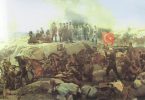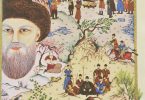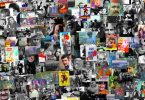Sheikh Ghalib says “There will come a day Ghalib will be remembered / And you will consider this conversation opportunity, a trophy,”. Sheikh Ghalib is entitled to say that since he is a great poet, but this is not the case for the things wish to express here, not at all.
Nefî has a verse I adore; maybe not the first but the second line is a motto for me. Nef’î says, “Those who are close to us, show us companionship, those are the ones we are familiar with.” In this council, I would like this to be a conversation between those who are familiar with each other.
DIVAN LITERATURE
About “Literature and Everything”… Here we can say that literature has priority. If you take notice, our subject is not “Everything and Literature” but the opposite. This is why we will talk about literature first, and then move on to everything. When literature is mentioned, I must highlight my personal preferences. Because for me literature is poetry. Why? I was a little alienated from forms that entered Turkish literature with the period called modernization. I am speaking of forms imported from the West like novel, story, theater, and essay. In a sense it is not even possible to talk about the form called “critique”. These are the forms that entered Turkish literature following Ottoman society’s modernization. The novel or story tradition in the Western sense can be seen in Turkish literature only after Tanzimat reforms. But poetry is there, always there. This means there was a poetry tradition before Turks converted to Islam. I am talking about a great poetry tradition which developed and became stronger with Islam, both in contexts of Divan literature and folk poetry… Reading works by Bâkî, Fuzûlî, Nedim, Nef’î and other great poets, I find myself telling my inner circle the following: “These people are better than us.” Our Divan Literature is a grand literature indeed. But unfortunately in our schools, we cannot sufficiently benefit from this treasure.
PUSHING POETRY INTO BACKGROUND
My argument has always been this: the expression of Islamic civilization is directly poetry. Today poetry being pushed into background, poets’ identities not being sufficiently discussed, and in contrast particularly novelists becoming more popular, is frankly saddening for me. Because if pushing poetry into background is the case, this means pushing civilization as well. Do we have to accept this as it is in the face of those saying “So what?” or “Now it is the age of novel”? Of course not. Because for centuries Turkish people have expressed themselves through poetry. I would actually like to start a discussion on this topic. As Tevfik Fikret said, “The flash of lightning occurs when ideas clash,”. Otherwise, there is no benefit in raising arguments which support one another. Within the frame of some dogmas, same things are repeated over and over, and new ways to prove something already proven are sought. This is a mental, in other words an intellectual disability. I will be a little orientalist because there is no other way. But this is not how things are in the West. In other words, an idea can only progress by argument and refutation. Same applies for science, too. If Newton had not argued Ptolemy, today we would still be claiming that the Sun revolves around the Earth.
FROM PHILOSOPHY TO REASONING
Citing French anthropologist Claude Lévi-Strauss: Jean-Jacques Rousseau has a book titled ‘Essay on the Origin of Languages’. In the book he claims “First conversations were in the form of poetry. Reasoning came after.” Here is something interesting. Why is poetry the first form of expression? This means there were no boundaries between spoken language and language of poetry then. Vocabulary was so limited that in order to convey a thought, one had to draw analogies to express what they knew. Just like in the infamous snakelightning story… When someone looks up, sees a lightning and calls it a “snake in the sky”, they actually generate a metaphor.
What does this example demonstrate? Now let’s move to another problem. If there was such a time gap between poetry and reasoning, then it must be exhibited that the relation between poetry and philosophy was impossible at the onset. Because philosophy is ultimately based on reasoning.
Back to the snake in the sky… I am one of those who think that building a metaphor does not suffice for reasoning. Because on the simplest level, one must regard syllogism which is logic. In this sense, a metaphor cannot be a premise for a syllogism. Although if it is logical within itself, the result concerning reasoning will not be true. For notions to be formed “reasoning” is required. And a clear Özellikdefinition of notions is imperative for this purpose. We know that philosophers before Socrates, Presocratics philosophized using poetry. This philosophy method was not based on systematic thinking but arose from metaphors. This is why Socrates is significant. He brought a systematic to philosophy and a reasoning phase followed. There are also those who claim the opposite. Friedrich Nietzsche says true philosophy is poetic. There is a vital point here. Today philosophy is no longer as grand and systematical as Hegel, Aristotle and Spinoza suggested. Latest examples are Martin Heidegger and Jean Paul Sartre. After that, philosophy became entirely fragmented. Ludwig Wittgenstein can be a good example for this. From this perspective, we can often come across this fragmented philosophy. So if we consider Wittgenstein a philosopher, we can also call Sheikh Ghalib a philosopher. Keeping the following in mind: There is no idea such as idea of philosophizing. Because each civilization has its own way of organizing, formatting and reflecting its own way of thinking. West built such a tradition after Socrates. Especially until Nietzsche. Saying that the most competent form of philosophy is based on this tradition is utterly an Orientalist fabrication, and this claim must be refuted.
PARTING OF WAYS: 19th CENTURY
There are sagas and fairy tales with an important place in literature. These works which can be referred to as oral literature or folk literature, were put in writing much later. Just like in the Epics of Homer… Oral literature tradition still survives today.
Recently, I think a Romanian ethnologist narrated that a peasant in Czech Republic read a 10 thousand lines long epic from memory. Karacaoğlan is also a good example. What I am trying to explain is distinctions in literary expressions emerged later on. Even in the West. For instance until 19th century there were no serious distinctions between poetry and prose in the West. However with Charles Baudelaire and names alike, poetry diverged from other forms with a radical line. This is also the case for theater. All plays of William Shakespeare are in fact poems. There are also examples of prose in Turkish literature. It is possible to come across poetry in form of prose in Turkish literature. Nazım Hikmet’s ‘Why did Benerci Kill Himself?’ is an example to this.









Leave a Comment